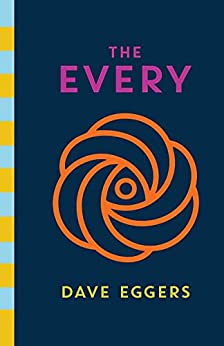More on this book
Community
Kindle Notes & Highlights
This is a work of fiction. Nothing described herein actually happened, though much of it likely will. At that point, this will be a work of nonfiction.
“For something so important in our lives, friendship is woefully unexamined and under-studied. I think we deserve better. If we value friendship as much as we say we do, then let’s get serious. Think of how much more genuine and authentic our friendships could be,” she said, “if we just apply the right metrics to them.”
Day to day, the consequences were minimal and seldom spoken. It was only when there was an assessment or dismissal that the data was awakened; then everything the underperforming employee had ever said or done was unearthed and examined and compared to averages, aggregates, standards and expectations.
No one is resting, and no one is accomplishing anything of real worth. It is, instead, the endless churning of middlebrow nonsense, of smiles, frowns, Popeyes, How U/Me fine, that keeps us from meaningful contemplation, or any hope of a new idea.
“I really think they have a problem with ideas at the Every,” Wes said. “That’s why they buy them. We knew this.” “Right, but then something strange happens. They buy companies, and they buy the people who came up with the ideas from those companies. Then those people come to the Every and their brains die. Is it complacency? The fatted calf?” “It’s fear.” “Yes, but it’s not just fear. It’s an involuntary reaction to the frozen atmosphere there. Like when testicles shrink in cold water. They retreat.”
Building on HappyNow? Delaney came up with Did I?, which used users’ ovals to determine whether orgasm was reached during any given coital session. A follow-up measured orgasm duration, intensity, and overall quality. Another update allowed the user to compare their orgasms with their friends, relatives and high-school crushes—and finally with any group in the world, the data divisible by region, demographics, income and genetic predisposition.
They wanted to be told what to do. They were free from freedom. The limitless choices of the world were suddenly made for them. Order was promised. The streets will be clean, the lawbreakers will be gone,
Sometimes she felt for him. He had been born annoying, and seemed to know it. He was so eternally needy, and eel-like, and shifty-eyed, that his every compensation or adjustment only seemed more needy, less convincing, and more pitiable.
“How is freedom best exercised?” he asked. He hadn’t looked down at his screen. This seemed to be an improvised question. “Willfully,” she said. “Irregularly. Through the refutation of custom. The breaking of patterns. The rational flouting of irrational rules. Keeping secrets. Being unseen. Solitude. Social indifference. Fighting ill-wrought power. Irreverence for authority. Moving without limit or schedule through the day and the world. Choosing when to participate and when to withdraw.”
Delaney checked her own screens and realized it was the quarterly deëmployment moment. The bottom 10 percent of every department was being let go, via text, determined by an algorithm. Those let go had no one to complain to, for no one was responsible.
Prayers to God were rarely answered, while shouts into cyberspace always receive a response, even if misspelled and hateful. Everything God offered—answers, clarity, miracles, baby names—the internet does better. Do you know how many times What is the meaning of life? was searched on your platforms last year? Twenty-one billion times. Every one of those queries got a reply. The one question that could not be answered, until now, is Am I good?
Every new generation purports to be more empathetic, and yet every new generation is less forgiving. And of course, with every coming year, technology ensures that no errors go unrecorded.”
Something mildly, distantly inappropriate had happened with her mother and Walt, she was sure of it. The situation had invited suspicion and Friendy had confirmed it. Her father was right. But was her mother right, too? Was she entitled to this, golf with flirtatious undertones at age sixty-one? So the harm was what? The crime was what? The crime was a private moment—something apart, something for herself after thirty-seven years of marriage. But there was no more nuance, no more give, no more gray. Only absolutes.
“They should have listened to you,” Delaney said. “Maybe, maybe not,” Agarwal said, and sighed. “I don’t know. It came from both sides. I didn’t quite see the complicity coming. The motivations of the companies, yes, to consolidate and measure and profit from the data, I saw that. But the everyday human side, no. Our overwhelming preference to cede all decisions to machines, to replace nuance with numbers…It surpassed all my nightmares. Every day, we make another machine that removes more human agency. We don’t trust ourselves or each other to make a single choice, a diagnosis, to assign a
...more


